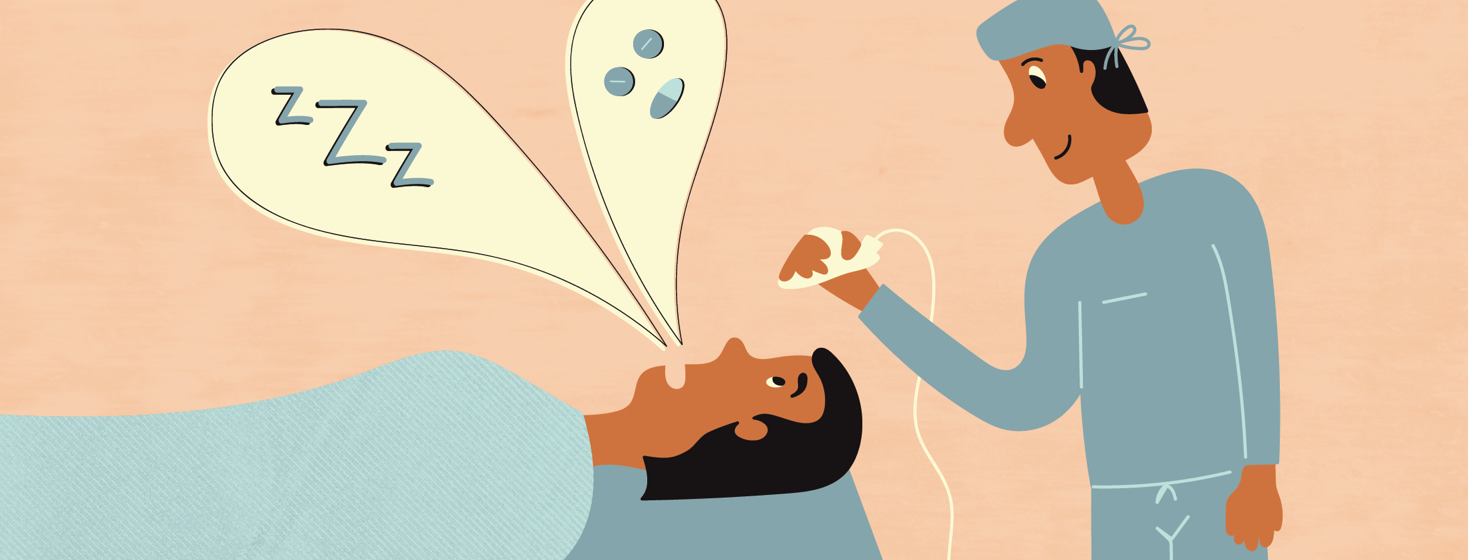Anesthesia, Idiopathic Hypersomnia, and Narcolepsy
Idiopathic hypersomnia (IH) and narcolepsy are both hypersomnolence disorders. Those living with these disorders experience excessive sleepiness during the day that is not related to the amount of sleep they get.1
People with narcolepsy may experience hallucinations before they fall asleep or when they wake up. They may have sudden muscle weakness (cataplexy) after strong emotions like laughing. Those living with IH may also experience lightheadedness or changes in their body temperature.2,3
Some people living with IH or narcolepsy have reported difficulty recovering from anesthesia. They felt that their symptoms worsened after surgery. Researchers hope to learn more about sleep disorders and anesthesia to understand how they are linked.1
How does anesthesia affect people living with IH and narcolepsy?
There are not many studies looking at how anesthesia affects those living with IH or narcolepsy. Much of the research is based on case studies, with reports written on experiences of 1 or a few people. There are also a few small studies.1
Experts are most interested in knowing if anesthesia will worsen IH or narcolepsy symptoms. They also would like to learn more about how these disorders affect waking up after anesthesia.1
Are there side effects?
A 2018 study looked at people living with restless legs syndrome, IH, and narcolepsy. They found that participants from the study did have side effects. They felt as though their symptoms worsened after surgery. The most common complaint was difficulty waking up in the morning. This is sometimes called “sleep inertia.”1
More research is needed
Another case study had slightly different results. The case study focused on one 55-year-old woman living with IH. She reported no change in her symptoms soon after her surgery or 4 weeks after her surgery. Researchers were also concerned that anesthesia may not be as effective in those living with hypersomnolence disorders. However, the woman in the case study did not report any issues with anesthesia during the procedure.4
This research is very early, and there is not much written on this topic. It is very important that more studies are done to truly understand the connection between anesthesia, IH, and narcolepsy.4
What can I do to prepare for surgery?
Though there is still more to learn about anesthesia’s effects on IH and narcolepsy, there are ways to prepare for surgery. Your doctor or anesthesiologist may not have much experience with your disorder. The most important thing you can do is to talk with your care team as soon as you learn that you may need surgery. This can help you create a relationship with them. It also gives your care team enough time to make a plan for your procedure.3
Tell your care team about your medications
When you meet with your anesthesiologist, discuss the medicines you take and your symptoms. IH and narcolepsy drugs may interfere with certain anesthetic drugs, so it is important for your care team to be aware of your medicines. It is also important that they understand your symptoms. This will help them monitor you before, during, and after surgery.3
Speak with your doctor about your medicines. In most cases, it is recommended that you take them as long as possible before the surgery. However, your doctor may recommend something different. Bring the medicines with you to the hospital. Not every hospital may carry the medicines you take, so this will ensure you will not miss any doses.3
Ask about what to expect
Before you are discharged to go home, speak with your doctors again. You may be sent home with new medicines while you recover from surgery. Speak with your care team about what to expect. Certain drugs like opiates may have side effects like drowsiness or very slow breathing. They can worsen your symptoms, so you may want to discuss other drug options with your doctor.3
It is very important to advocate for yourself. Your care team is there to work with you to make sure you are as healthy as possible. Communicating early and often can help you receive the best care possible.3
If you have more questions about IH, narcolepsy, or an upcoming surgery, speak with your doctor.

Join the conversation